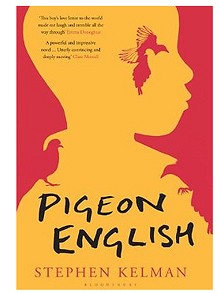Pigeon English by Stephen Kelman
Published by Bloomsbury
Pigeon English is ‘written from an eleven-year-old’s view, but (it) is not a children’s novel’ reads the appended discussion notes in this edition, and so it has come to pass with Stephen Kelman’s nomination for the 2011 Man Booker Prize.
This is a stark modern tale, of Harri, who has come to England from Ghana with his mother and sister Lydia. His father, grandmother and baby sister Agnes are still in Ghana awaiting the opportunity to join them. The back story is vague and adds to the unsettling sense of foreboding that saturates Harri’s random and childish musings. Something doesn’t add up – why is his mother paying rent and giving ’rent’ money to Julius? Why is Auntie Sonia living with him when there is no warmth between them?
Mamma is too busy working to know what is happening to her children as they battle to adapt to life on an inner city estate, their values buckling with heart-breaking inevitability in their struggle to survive socially, and increasingly, physically.
Harri thinks that as long as he doesn’t mess with anyone, the gangs will leave him alone, but the reader sees the compromises he has to make as he is sucked into gang culture, a hapless pawn in a war he is only vaguely aware of.
This is a powerful – and horrifying – first novel, told with gentle humour, love and profound insight.
My one criticism is the eponymous pigeon, a device to bring an all-seeing, all-knowing benevolence into the story. A Boo Radley-type watcher from the tower block would keep the novel rooted in reality, whereas the speaking pigeon undermines it – oh why are book editors so slack?
ISBN: 1408810638



